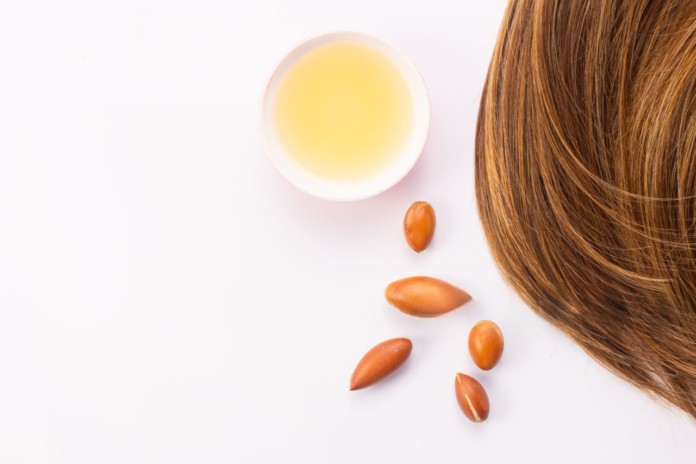In the world of natural beauty, few ingredients have gained as much attention as argan oil. Often called “liquid gold,” argan oil has been treasured for centuries by Moroccan women for its nourishing, moisturizing, and healing properties. Today, it’s become a global favorite for those looking to address dry skin and frizzy, unmanageable hair naturally.
But what makes argan oil so effective? Let’s explore the science, benefits, and best practices for using argan oil on dry skin and frizzy hair—and why it belongs in your beauty routine.
What Is Argan Oil?
Argan oil is extracted from the kernels of the argan tree (Argania spinosa), which is native to Morocco. Rich in essential fatty acids, vitamin E, and antioxidants, argan oil is used both as a cosmetic and dietary product. In skincare and haircare, it’s celebrated for its ability to hydrate, soften, and protect.
Why Argan Oil Works for Dry Skin
1. Rich in Essential Fatty Acids
Dry skin lacks the natural oils it needs to stay soft and supple. Argan oil contains oleic acid and linoleic acid, which help replenish the skin’s lipid barrier, reducing moisture loss.
2. Vitamin E for Skin Repair
Argan oil is loaded with tocopherol, a form of vitamin E, which supports skin regeneration and improves elasticity. This helps reduce flakiness, rough patches, and discomfort from dryness.
3. Non-Comedogenic and Lightweight
Unlike some oils, argan oil is non-comedogenic (won’t clog pores) and absorbs quickly. This makes it suitable even for people with sensitive or acne-prone skin.
4. Anti-Inflammatory Benefits
For those dealing with eczema, psoriasis, or irritated dry skin, argan oil’s natural anti-inflammatory compounds can help soothe redness, itching, and inflammation.
How to Use Argan Oil on Dry Skin
- As a daily moisturizer: Apply 2-3 drops after cleansing while your skin is still damp.
- In DIY masks: Combine argan oil with honey or yogurt for deep hydration.
- As an overnight treatment: Massage a few drops before bed for soft, radiant skin in the morning.
Why Argan Oil Works for Frizzy Hair
1. Seals the Cuticle
Frizz occurs when the hair cuticle is rough and open. Argan oil smooths the cuticle layer, helping hair look sleeker, shinier, and more manageable.
2. Protects from Heat and UV
Using styling tools? Argan oil forms a protective barrier that guards against heat damage and UV rays, two major culprits of frizz and split ends.
3. Deep Conditioning Properties
As a natural emollient, argan oil penetrates the hair shaft, hydrating from within and reducing dryness and breakage.
4. Tames Flyaways and Adds Shine
A few drops of argan oil can instantly improve hair texture, tame flyaways, and give your strands a healthy shine—without feeling greasy.
How to Use Argan Oil on Frizzy Hair
- As a leave-in serum: Rub 2-4 drops between your palms and apply to the mid-lengths and ends of damp or dry hair.
- Pre-shampoo treatment: Massage oil into your scalp and hair, leave for 30 minutes, then shampoo.
- As a styling finisher: Use after blow-drying or flat ironing to smooth and add shine.
Benefits of Argan Oil for Skin and Hair at a Glance
| Feature | Skin Benefits | Hair Benefits |
| Vitamin E | Reduces dryness and inflammation | Promotes shine and strength |
| Essential fatty acids | Hydrates and nourishes skin | Conditions and smoothens hair |
| Antioxidants | Fights environmental damage | Protects from heat/UV damage |
| Lightweight texture | Absorbs easily, non-greasy | No heavy residue, defines curls |
| Anti-inflammatory | Soothes irritated skin | Calms itchy scalp |
Is Argan Oil Safe for All Skin Types?
Yes, generally. Argan oil is:
- Hypoallergenic
- Non-irritating
- Suitable for all skin types—including oily, combination, and mature skin
However, if you have nut allergies, patch test before use, as argan oil is derived from a nut.
Argan Oil vs. Other Oils: What Makes It Special?
Compared to coconut oil or jojoba oil:
- Argan oil has a higher vitamin E content
- It’s less greasy than coconut oil
- More versatile than heavier oils like castor oil
This balance of hydration and lightness makes it ideal for both skin and hair without clogging pores or weighing hair down.
Common Questions About Argan Oil
Can I Use Argan Oil Daily?
Absolutely. It’s gentle enough for daily use on both skin and hair.
Can Argan Oil Help With Acne?
Yes—because it’s non-comedogenic, it won’t clog pores. It also has anti-inflammatory and antioxidant properties, which may help reduce acne symptoms.
Does Argan Oil Expire?
Yes, typically in 12–24 months. Store it in a cool, dark place in a dark glass bottle to maintain freshness.
Is Argan Oil Good for Scalp Health?
Definitely. Massaging it into the scalp can reduce dryness, flakiness, and even dandruff, thanks to its moisturizing and anti-inflammatory effects.
How to Choose the Right Argan Oil
To get the best results, look for:
- 100% pure, cold-pressed argan oil
- Labeled as organic or certified
- Sold in dark amber bottles (protects from sunlight)
- No added fragrances, preservatives, or fillers
Avoid products labeled “with argan oil”—they may only contain small amounts.
Final Thoughts: Why Argan Oil Belongs in Your Beauty Routine
Whether you’re battling dry, flaky skin or fighting to tame frizzy, damaged hair, argan oil is a natural, versatile, and proven solution. Its rich nutrient profile, light texture, and multiple benefits make it a must-have for anyone serious about clean beauty.
Ready to transform your skincare and haircare game? Add argan oil to your daily routine and experience the glow-up—naturally.



